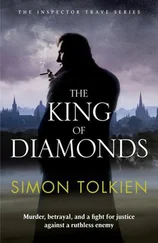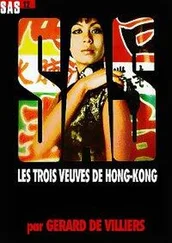‘What’s he got to do with it?’ André asked. ‘Does he owe you money?’
‘I think I owe him, actually.’
‘Then surely the only thing to do is to lug your stuff into a taxi and get the hell out? He’ll never trace you to Tung Lung.’
Alan could not help but think about this. Such a manoeuvre would, he reckoned, save him about $2,500. The thought went, and he was sorry to see it go. ‘André – can I be utterly frank with you? I don’t have the nerve.’
André looked for a moment deeply saddened, as if by a friend’s unwitting blasphemy. ‘My dear, it’s hardly the right way to begin your career as a freebooter.’
‘André, I was brought up to be honest – more or less, anyway. It’s a handicap. But keep faith with me; I’m sure I shall rise above it in time.’
Alan stood at the centre of a kind of refugees’ camp. Six vast striped plastic bags formed a circle around him: the contents of his flat in Mid-Levels. He had in his pocket a cheque for $1,000, returned deposit on the furniture.
The loading and unloading of the taxi had been accomplished, not without superhuman exertions. The carrying of the bags, two by two through the little gate beside the ferry turnstile, normally used for the passage of vegetables, had brought out resources Alan did not know he possessed. But the next stage, the carriage of bags to the ferry, seemed impossible. He could not even begin to think about the 176 steps.
The ferry arrived, and eventually opened its doors to admit new passengers. Alan made his first effort, and carried two bags on board. He fought his way back against the unstemmable tide of passengers to collect two more, in a state of blind frazzlement. He had just reached his encampment when he heard a voice call: ‘New neighbour!’
An impression of suit, size and extraordinary freshness of face. Alan was not quite in the mood for being bothered, but managed a flustered greeting.
‘Your gear?’ the stranger demanded.
‘Yes, I –’
‘Hold,’ he said sternly. He handed Alan a briefcase and a pink carrier bag. Then he squatted, and addressed the four bags rather formally. He inserted his arms through all the handles, straightened his back, and seized his own forearms in a grip of steel. He inhaled and exhaled through his nose, very noisily, about half a dozen times. Then he stood. Miraculously, the bags rose with him. He marched inexorably to the boat, benignly shoving passengers from his path with every step, tendons standing out from his neck like steel hawsers, breath roaring from his nose. Alan followed bearing his presumed neighbour’s briefcase, his own shoulder-bag full of valuable items, and the pink carrier bag. Condensation had formed, though not to his surprise, on its surface. With every appearance of relish, the neighbour lowered his preposterous load to the floor, back still perfectly straight.
‘Thank you,’ Alan said inadequately.
The neighbour rose with slow grace from his squat, and rotated his shoulders just once, so that the shoulder blades almost touched. Then he made a strange, rather papal gesture to the stairs that led to the top deck of the boat and a smile of rather unearthly beauty lit his face. ‘Beer!’ he said. Then he turned and absolutely sprinted up the stairs.
Alan followed more sedately, arriving on the top to find his neighbour sitting on the very back seat, both arms outstretched along its back in a crucifixion position. Alan passed him his two bags. The briefcase was placed on the floor, but from the carrier bag he produced two cans of San Miguel, passing one to Alan. Alan thanked him and reached for the ringpull. The neighbour at once placed a huge paw over Alan’s hand. ‘Wait!’ he said. ‘Not until the ferry moves.’
He sat quite silent, after this, his own unopened can in his hand and a rather solemn expression on his face. Alan watched as the stragglers came aboard. The day was chill, and most people wore jackets on top of shirts. They crowded together towards the front, enclosed section of the boat, from love of crowds, from dislike of air. There was a clatter from below as the gangplank was raised. The engine roared, and the ferry pulled away with the usual exchange of referees’ whistles. Alan’s neighbour, roused from a species of trance, smiled his beatific smile, tore the ringpull from his can, tossed it over his shoulder into the wash of the screw behind them and then positively threw the can into his face. Alan watched, fascinated, as his throat worked convulsively, like a pump. At last, he lowered the can, and smiled again.
‘Hello, new neighbour. I’m Charles Browne, the man upstairs. Browne with an E.’
Alan said his own name, and they shook hands. The clasp was gentle, unKingston-like.
‘You are going to like Tung Lung,’ Charles said.
‘Have you lived here long?’
‘Tung Lung? Or Hong Kong?’
‘Both, I suppose.’
‘Hong Kong, all my life, or twenty years. Tung Lung, ever since I went to the bad, or about two years. Here’s how!’ He raised his can once again and drank with the same primeval ferocity as before. He tossed the can, presumably now empty, over the back of the boat. He took another from his pink bag and opened it. ‘Your beer all right?’
‘Yes, great, thanks.’
‘I mean, you do drink?’
‘Of course.’
‘I mean, not a single beer and that’s it for me thanks, I’ve got a busy day tomorrow.’
‘No.’
‘In fact,’ Charles said, more or less beseechingly, ‘you drink quite a lot.’
‘Well –’
‘And get drunk and throw up and go to bed and it spins and get up next morning feeling shithouse and then have a drink to feel better.’
There was an expression of touching eagerness on Charles’s face. Alan could not bear to disappoint him. ‘Oh yes.’
‘Well then. Time for another beer, isn’t it?’
Alan made a quite heroic effort. He lifted his can, half full, and finished it in a series of frantic swallows. Tears pricked the back of his eyes and he wondered for a second if the shock of the chill and the bubbles would effect an instant purgation, even as he wiped his mouth with feigned relish. He threw his can overboard and took the new one.
‘Good man!’ Charles said, with restrained violence.
Alan opened his new can and consigned its ringpull to the deep. He took a semireluctant sip. ‘Are there many Browne-with-an-Es in Hong Kong?’ he asked. ‘I came across that name once or twice when I was working for the Hong Kong Times. ’
‘Course you came across the name. My old man owns the bloody place.’
‘What bloody place?’
‘Hong Kong, of course.’
‘He can’t actually own all of it, can he? I expect you’re having me on.’
‘Well, sucks to you, because he does. More or less, anyway. My old man happens to be the chairman of the South China Bank.’
Once again, the wheel spun full circle before him. ‘Golly,’ Alan said. ‘That’s quite a grown-up job, really.’
There was a split-second pause, during which Alan thought he might have caused serious offence. Then Charles threw back his head and gave a dramatic howl of laughter. ‘Grown-up!’ he said. ‘My old man’s got a grown-up job!’ He laughed out of all proportion to the merits of Alan’s remark, rocking forward, resting his forehead on his beercan, finally emerging, wiping his eyes. ‘So that’s what’s wrong with the bastard,’ he said. ‘He’s got a grown-up job!’
‘I had a grown-up job last week,’ Alan said. ‘But I got fired.’
‘Is that why they sacked you?’ Charles asked. ‘They discovered you weren’t a grown-up?’
‘That must be it.’
‘André hasn’t got a grown-up job,’ Charles said. ‘I don’t think King has one either. He acts as if he has one, but I think he’s only pretending.’
Читать дальше












